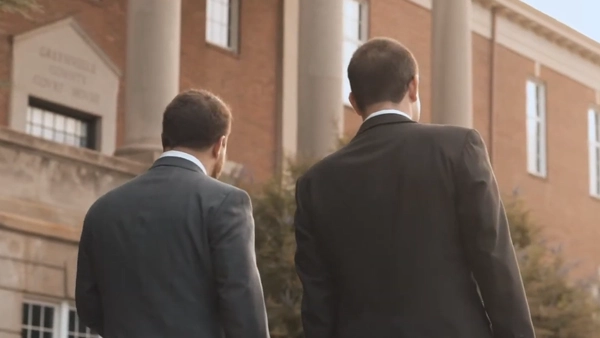If you’ve suffered a concussion in a car wreck or other accident, then you may be having balance problems, and nausea and vomiting among other post-concussion symptoms. If so, you’re not alone. It’s estimated that 78% of people who have suffered from a traumatic brain injury, such as a concussion, will experience trouble with balance, and people can also experience nausea and vomiting.
Call our offices today to discuss your injury and potential claim with our personal injury lawyer in Greenville.
Your Balance: Why It’s Important
Balance is the way your body centers itself over your feet. Your ability to keep your balance depends on many things including your senses, your ability to think, and your physical strength.
Without being able to maintain proper balance, you could suffer falls, which could lead to another concussion or traumatic brain injury or even broken bones. If your balance is poor, it could prevent you from performing certain activities such as work, participating in sports, or driving.
Issues with your Personal Balance

There are three systems that help you with balance. They are the:
- Vestibular system. This system begins in your inner ear and travels along your vestibular pathways to the eighth cranial nerve to your brain.
- Visual system. This system feeds visual information to your brain about what is around you including things that are moving.
- Proprioceptive system. This system tells your brain about motion, your posture, and your balance from receptors in your muscles and joints.
If any of these systems are not functioning properly due to a concussion from a car accident you may experience trouble with balance.
Symptoms of Balance Problems
After a concussion, you may experience symptoms involving your balance. Symptoms include:
- Nausea
- Feeling dizzy, especially if you get up fast
- Lightheadedness
- Vertigo
- Coordination issues
- Motion Sickness
- Slow reaction time
- Falling
- Bumping into things
Causes of Balance Problems after A Concussion or Traumatic Brain Injury
There can be a variety of causes for balance problems after a concussion. Symptoms include:
- Medications: Some medications such as blood pressure medicine, antibiotics, heart medicines, and anti-seizure medications can all cause balance problems.
- Eyesight: If you’re experiencing double vision, light sensitivity, or other eyesight problems due to your concussion or other medical issues, it can affect your balance
- Inner Ear Problems: If your vestibular system, or inner ear, is damaged by your concussion, you could experience balance issues.
- Benign paroxysmal positional vertigo (BPPV): BPPV is associated with your inner ear and is one of the most common causes of vertigo and/or balance problems. If, as a result of your concussion, the crystals in your inner ear were moved, or jarred out of place, you could become more sensitive to gravity and thus suffer from vertigo or balance problems.
How To Improve Your Balance
There are several things you can do to improve your balance after a concussion or other traumatic brain injury. They include:
- Specific exercises: Exercises that improve your strength and flexibility can help you to improve your balance. Exercises such as mini-squats or standing leg lifts can help you, but you should speak to your doctor before beginning any exercise program after your concussion.
- Stand or Walk in Different Conditions: You could practice standing with your eyes closed, or change how far apart your feet are and change their position such as moving them close together or putting one foot in front of the other.
- Walk on different surfaces: Try walking on grass, sidewalks, or carpet. Make sure you have someone with you that you can hold onto if you feel you are losing your balance.
- Doing activities while you walk: You could try walking and talking with someone or walking in crowded places such as a mall or other store. Again, be sure to have someone with you to hang onto if you are losing your balance.
It may take time to regain your balance after a concussion, so be patient with yourself. Also, if you’ve been diagnosed with BVVP after your concussion, a good ear, nose, and throat doctor may be able to help you with your balance issues.
Nausea and Vomiting After a Concussion
Nausea and vomiting are controlled by the same part of your brain, and if you’ve suffered a concussion or other traumatic brain injury, these symptoms could indicate that there is increased pressure on your brain or brain stem.
The nerve centers in your brain that control nausea and vomiting are extremely sensitive to pressure changes in your brain. Additionally, a sudden jolt, such as that caused by a concussion, can disorientate the balance centers in your brain that assist your body in controlling nausea.
Vomiting after a head Injury
Vomiting is one of the symptoms of a concussion, and, along with nausea, is one of your body’s ways of telling you something is wrong. Vomiting after a concussion could also mean that there are chemicals that were released by an imbalance in your brain while it heals.
If you are experiencing frequent vomiting, such as vomiting more than two times, after your concussion, you should go to the emergency room of your local hospital and get checked out. Vomiting after a concussion could mean that there is a bleed in the brain which is a medical emergency. The doctor in the Emergency Room may perform a CT scan to make sure there’s not a bleed in your brain. If the CT scan turns out negative, the doctor may prescribe an anti-vomiting medication such as Zofran or Phenergan. It is important to understand that a negative CT scan does not mean that you did not suffer a concussion—it simply means that there is not a bleed in your brain.
The attorneys at the Greenville, South Carolina law office of David R. Price, Jr., P.A., strongly advise that you get medical treatment as soon as possible after being the victim of a concussion. It’s important that you receive the best care possible for your concussion or another traumatic brain injury so you can heal and get back to your life. In addition, if you are injured because of the negligence of another person, whether it was in a car wreck or other accident, it is important that you address your legal case as quickly as possible. Contact us today to speak to the attorneys at David R. Price, Jr., P.A..







